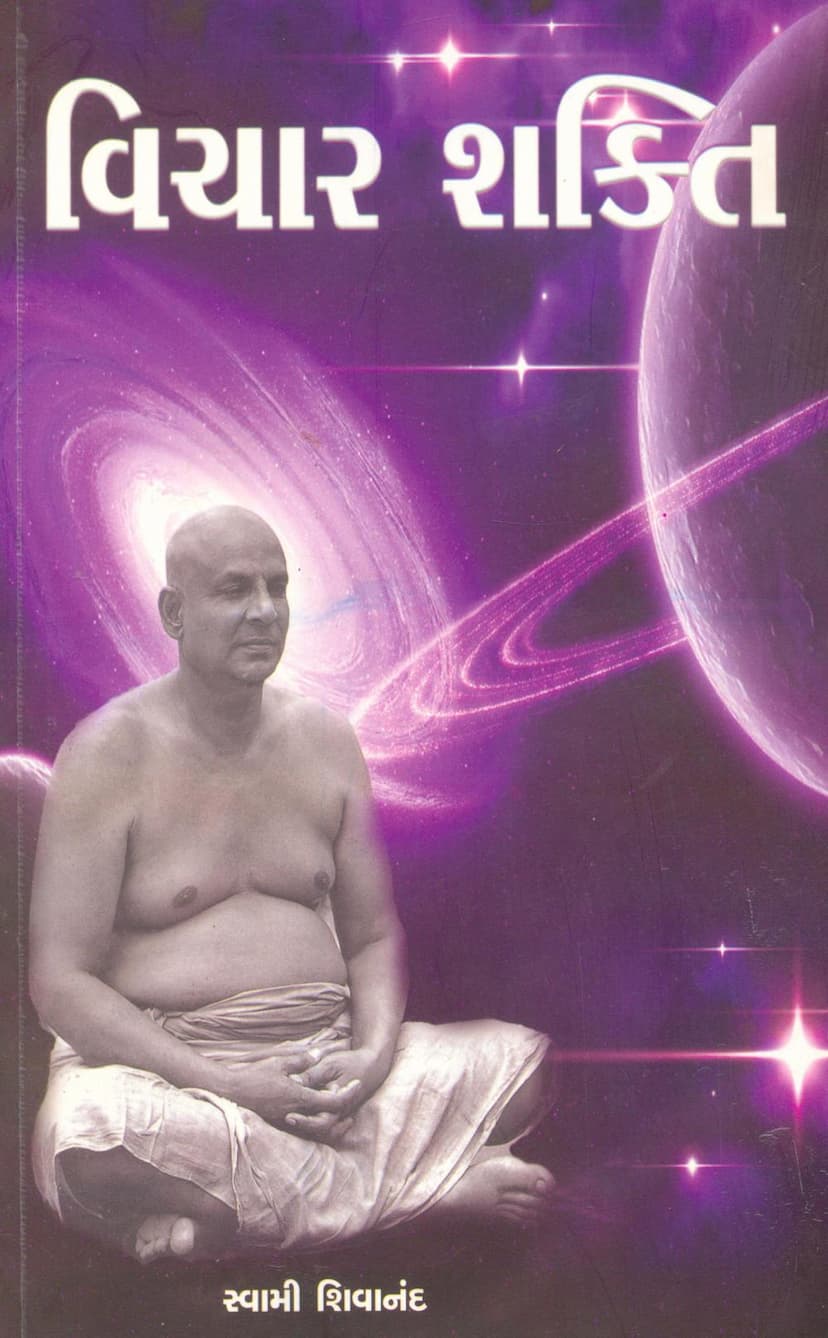Vichar Shakti
Added to library: September 2, 2025

Summary
Here is a comprehensive summary of the Jain text "Vichar Shakti" (Thought Power) by Swami Shivanand, based on the provided pages:
Book Title: Vichar Shakti (Thought Power) Author: Swami Shivanand Saraswati Publisher: Swami Shivanand Gyanyagna Nidhi, Divya Jivan Sangha, Ahmedabad.
Overview:
"Vichar Shakti" is a profound treatise on the immense power of thought and its impact on an individual's life, destiny, and the universe. Swami Shivanand, a revered spiritual master, elucidates the science and secrets behind thought power, offering practical guidance on how to harness and direct it for personal growth, spiritual evolution, and the betterment of the world. The book emphasizes that our thoughts are not mere fleeting notions but potent forces that shape our reality.
Key Themes and Concepts:
- The Immense Speed and Power of Thought: The book begins by highlighting the almost instantaneous nature of thought, far exceeding the speed of light. It explains that thoughts travel through a subtle medium, "mind-matter," permeating the entire universe. These thought vibrations influence others and can create a pervasive mental atmosphere.
- Thoughts as Living Entities: Swami Shivanand presents thoughts as conscious, tangible entities, not just abstract concepts. He states that thoughts do not perish with death but continue to exist, influencing the subtle fabric of existence.
- The Medium of Thought Transmission: Similar to how ripples spread in water or light waves travel through ether, thoughts propagate in all directions through the subtle medium of "mind-matter." This allows for telepathic communication and the transmission of emotions and ideas across vast distances.
- The Impact of Thoughts on Health and Well-being: The text details how thoughts directly affect the physical body. Negative thoughts like fear, worry, anger, and jealousy weaken the body's cells and lead to illness. Conversely, positive thoughts like joy, peace, and love invigorate the body and promote health.
- Thought as the Architect of Destiny: The book strongly asserts that thoughts are the primary architects of our destiny. Our current circumstances are a direct reflection of our past thoughts and actions. By consciously cultivating positive and powerful thoughts, one can actively shape their future and create a favorable destiny.
- The Principles of Thought Control: A significant portion of the book is dedicated to practical methods for controlling and directing thoughts. These include:
- Concentration (Ekaagrata): Focusing the mind on a single point or object to channel thought energy.
- Willpower (Sankalpa Shakti): Developing strong determination and resolve to direct thoughts towards desired outcomes.
- Mental Discipline: Regularly observing and managing thoughts, eradicating negative ones, and replacing them with positive affirmations.
- Contrarian Thought (Pratipaksha Bhavna): Counteracting negative thoughts with their opposite positive counterparts (e.g., replacing anger with love, fear with courage).
- Mindful Awareness: Remaining a detached observer of one's thoughts without getting entangled in them.
- Spiritual Practices: Engaging in meditation, prayer, chanting, and scriptural study to purify and elevate the mind.
- The Influence of Thoughts on Character and Personality: Our thoughts sculpt our character. Consistent thoughts and intentions manifest as habits, which in turn shape our personality and actions. A person's face, demeanor, and even their actions are a direct reflection of their inner thought process.
- The Law of Attraction in Thought: The principle of "like attracts like" is applied to thoughts. Positive thoughts attract similar positive influences and circumstances, while negative thoughts attract negativity.
- The Power of Suggestion and Autosuggestion: The book touches upon the potent impact of suggestion, both from external sources and from within (autosuggestion), in influencing our thoughts, feelings, and actions.
- Thoughts and Spiritual Realization: Ultimately, the mastery of thought power is presented as a crucial step towards spiritual enlightenment and God-realization. By transcending the limitations of the mind and its incessant thought-waves, one can realize their true, eternal nature as the Self or Atman.
- The Creation of Reality: The book posits that our external reality is a projection of our inner thoughts and beliefs. What we experience in the world is a manifestation of our dominant thought patterns.
- The Importance of Purity of Thought: Just as pure food leads to pure thoughts, the quality of our thoughts is influenced by our intake of information, our environment, and our inner state. Cultivating pure and noble thoughts is essential for spiritual progress and a harmonious life.
Key Takeaways:
- Thought is Power: Our thoughts are incredibly potent forces that shape our lives and the world around us.
- Control Your Thoughts: By understanding the principles of thought power and practicing mental discipline, one can gain mastery over their thoughts.
- Cultivate Positive Thoughts: Consciously choosing and cultivating positive, constructive, and divine thoughts is paramount for well-being, success, and spiritual growth.
- Thoughts Create Reality: Our external world is a reflection of our inner world. By transforming our thoughts, we transform our reality.
- Personal Responsibility: Each individual is responsible for the quality of their thoughts and, consequently, their life experiences.
Target Audience and Purpose:
This book aims to guide individuals towards self-mastery, spiritual elevation, and a more fulfilling life by enlightening them about the power of their own minds and thoughts. It is intended for anyone seeking to understand and harness their inner potential for personal transformation and well-being.
In essence, "Vichar Shakti" serves as a comprehensive guide to understanding and leveraging the fundamental force of thought for a life of purpose, peace, and spiritual fulfillment.